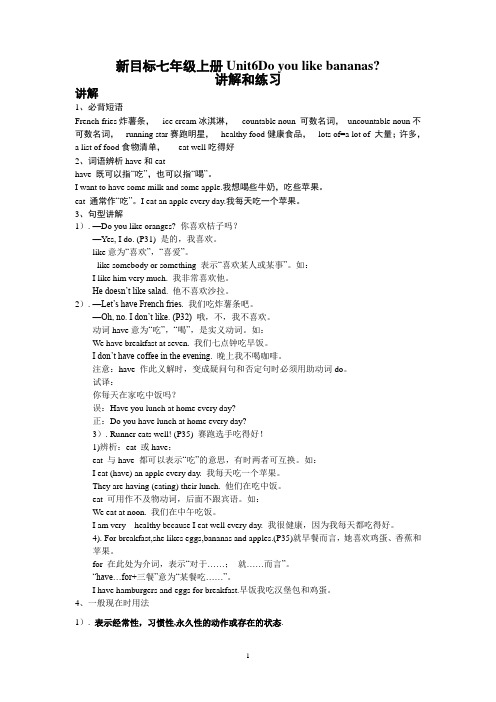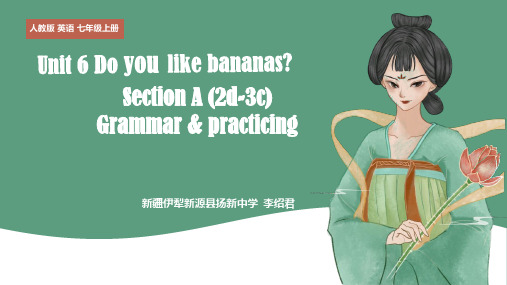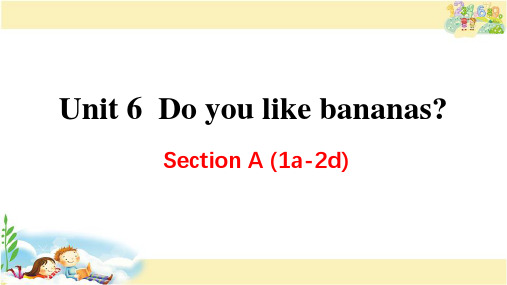七年级英语上册Unit6Doyoulikebananas学案5
- 格式:doc
- 大小:164.50 KB
- 文档页数:6

Unit 6 Do you like bananas? 讲义一、【重点单词】banana /bə'nɑ:nə/香蕉hamburger /'hæmbɜ:(r)ɡə(r)/汉堡包tomato /tə'mɑ:təʊ/西红柿ice-cream /,aɪs'kri:m/冰激凌salad /'sæləd/沙拉strawberry /'strɔ:berɪ/草莓pear /peə(r)/梨milk /mɪlk/牛奶bread /bred/面包birthday /'bɜ:(r)θdeɪ/生日dinner /'dɪnə(r)/(中午或晚上吃的)正餐week /wi:k/周;星期food /fu:d/食物sure /ʃʊə(r)/当然;肯定;一定burger /'bɜ:(r)ɡə(r)/汉堡包= hamburgervegetable /'veʤtəbəl/蔬菜fruit /fru:t/水果right /raɪt/正确的;适当的apple /'æpl/苹果then /ðen/那么egg /eɡ/蛋;鸡蛋carrot /'kærət/胡萝卜rice /raɪs/大米;米饭chicken /'ʧɪkɪn/ji鸡肉so /səʊ/ (引出评论或问题)那么breakfast /'brekfəst/早餐;早饭lunch /lʌnʧ/午餐star /stɑ:(r)/明星;星星eat /i:t/吃well /wel/好;令人满意的habit /'hæbɪt/习惯healthy /'helθi/健康的really /'ri:əli/真正地question /'kwesʧən/问题want /wɒnt/需要;想要be /bi:/变成fat /fæt/肥的;肥胖的二、【重点短语】1. John ’s birthday dinner 约翰的生日宴会2. vegetable salad 蔬菜沙拉3. two tomatoes 两个西红柿4. eat well 吃得营养5. think about 考虑6. eat/have breakfast/lunch/dinner 吃早/午/晚饭7. sports stars 体育明星8. the volleyball star 排球明星9. ask sb. about sth. 问某人某事10. like hamburgers/ice-cream 喜欢汉堡包/冰淇淋11. like eating eggs 喜欢吃鸡蛋12. her eating habits 她的饮食习惯13. be (not) healthy (不)健康14. one last question 最后一个问题15. healthy food 健康食物16. after breakfast/lunch/dinner 早/午/晚饭后17.one last question 最后一个问题18.some fruit 一些水果19.for dinner 作为晚餐20.how about 怎么样三、【重点句型】1.—Do you like salad? 你喜欢沙拉吗?一Yes,I do. /No, I don’t. 是的,我喜欢。

新目标七年级上册Unit6Do you like bananas?讲解和练习讲解1、必背短语French fries炸薯条,ice cream冰淇淋,countable noun 可数名词,uncountable noun不可数名词,running star赛跑明星,healthy food健康食品,lots of=a lot of 大量;许多,a list of food食物清单,eat well吃得好2、词语辨析have和eathave 既可以指“吃”,也可以指“喝”。
I want to have some milk and some apple.我想喝些牛奶,吃些苹果。
eat 通常作“吃”。
I eat an apple every day.我每天吃一个苹果。
3、句型讲解1). —Do you like oranges? 你喜欢桔子吗?—Yes, I do. (P31) 是的,我喜欢。
like意为“喜欢”,“喜爱”。
like somebody or something 表示“喜欢某人或某事”。
如:I like him very much. 我非常喜欢他。
He doesn’t like salad. 他不喜欢沙拉。
2). —Let’s have French fries. 我们吃炸薯条吧。
—Oh, no. I don’t like. (P32) 哦,不,我不喜欢。
动词have意为“吃”,“喝”,是实义动词。
如:We have breakfast at seven. 我们七点钟吃早饭。
I don’t have coffee in the evening. 晚上我不喝咖啡。
注意:have 作此义解时,变成疑问句和否定句时必须用助动词do。
试译:你每天在家吃中饭吗?误:Have you lunch at home every day?正:Do you have lunch at home every day?3). Runner eats well! (P35) 赛跑选手吃得好!1)辨析:eat 或have:eat 与have 都可以表示“吃”的意思,有时两者可互换。


Unit 6 Do you like bananas?Part 1 Words and Expressionsbanana /bə'nɑːnə/ n. 香蕉hamburger /'hæmbɜː(r)gə(r)/ n. 汉堡包tomato /tə'mɑːtəʊ/ /tə'meɪtəʊ/n. 西红柿ice-cream /,aɪs'kri:m/ n. 冰激凌salad /'sæləd/ n. 沙拉strawberry /'strɔːbəri/ n. 草莓pear/peə(r)/ n. 梨milk /mɪlk/ n. 牛奶bread /bred/ n. 面包birthday /'bɜː(r)θdeɪ/ n. 生日dinner /'dɪnə(r)/ n.(中午或晚上吃的)正餐week /wiːk/ n. 周;星期think about 思考;思索food /fuːd/ n. 食物sure /ʃʊə(r)/ adv. 当然;肯定;一定How about…?(提出建议)……怎么样?burger /'bɜː(r)gə(r)/ n. (= hamburger) 汉堡包vegetable /'vedʒtəbl/ n. 蔬菜fruit /fruːt/ n. 水果right /raɪt/ adj. 正确的;适当的apple /'æpl/n. 苹果then /ðen/adv. 那么egg /eg/ n. 蛋;鸡蛋carrot /'kærət/ n. 胡萝卜rice /raɪs/ n. 大米;米饭chicken /'tʃɪkɪn/ n. 鸡肉so /səʊ/ conj.(引出评论或问题)那么breakfast /'brekfəst/ n. 早餐;早饭lunch /lʌntʃ/ n. 午餐star /stɑː(r)/ n. 明星;星星eat /iːt/ v. 吃well /wel/ adv. 好;令人满意地habit /'hæbɪt/ n. 习惯1healthy /'helθi/adj. 健康的really /'riːəli/ adv. 真正地question /'kwestʃən/ n. 问题want /wɒnt/ v. 需要;想要be /biː/ v. 变成fat /fæt/adj. 肥的;肥胖的Part 2:Texts课文(一)Jack: Hey, John’s birthday dinner is next week. Let’s think about the food.Tom: Sure. How about burgers, vegetable salad, and some fruit? Bill: Sounds good. John likes hamburgers.Jack: Oh, I don’t like salad.Bill: But John likes salad, and it’s his birthday.Jack: Yes, you’re right. What about the fruit?Tom: I think John likes strawberries and apples.Jack: OK. Let’s have strawberries and applesthen.Structure——谈论好恶1.Do you like salad? Yes, I do./No, I don’t.2.Do they like pears? Yes, they do./ No, they don’t.3.Does she like tomatoes? Yes, she does./ No, she doesn’t.4.I like oranges. I don’t like bananas.5.We like rice. We don’t like hamburgers.6.He likes ice-cream. He doesn’t like vegetables.重点句型:—Do / Does sb. like…?—Yes, sb. do / does.—No, sb. don’t / doesn’t.sb. like/likes ….sb. don’t/doesn’t like ….Underline the correct words in the brackets.在括号内正确的单词下画线。


Unit 6 Do you like bananas一、阅读理解。
A【题文】Mum gives little Tom ten yuan. Then little Tom goes shopping. He gets on the bus and sits down next to an old woman. Then he sees the old woman’s bag is open. There is ten yuan in it. He quickly looks into his pocket. The money isn’t there now! Little Tom is sure that the old woman is a thief(小偷). He decides(决定)to take back the money from the old woman’s bag. So he carefully puts his hand into the old woman’s bag,takes the money and says nothing. Suddenly (突然地)the old woman shouts,“Where is my money? I can’t find it. There is a thief in the bus.” Little Tom feels str ange(奇怪的). Then he sees his own ten yuan under his seat. Little Tom is thinking a question now,“Am I a thief ?”1. 【小题1】 is sitting beside little Tom.A. A young womanB. An old womanC.A young manD. An old man2. 【小题2】 Little Tom sees in the old woman’s bag.A. a walletB. a packetC. ten yuanD. ten dollars3. 【小题3】 Litt le Tom is sure that the old woman is a .A. thiefB. teacherC. rich womanD. poor woman4. 【小题4】 Little Tom sees ten yuan under his seat.A. his ownB. the old woman’ sC. the thief’ sD.the driver’ s5. 【小题5】Which of the following is right?A. Little Tom is a bad boy.B. Little Tom often steals(偷)things.C. Mum gives little Tom twenty yuan.D. Little Tom makes a mistake(错误).【答案】1.【小题1】B2.【小题2】C3.【小题3】A4.【小题4】A5.【小题5】D【解析】试题分析:这篇短文讲述的是Tom在公交车上看到挨着他的老太太包里有10元钱,而他自己的 10元钱恰好不见了,他就以为是那个老太太偷了他的。
Unit 6 Do you like bananas?课时1 Section A(满分:100分时间:40分钟)一、根据句意及汉语提示填写单词。
(共10小题,每小题2分,共20分)1. What ________ (食物) does your son like?2. Some ________ (鸡蛋) are under the sofa.3. We can see three ________ (胡萝卜) on the table.4. Tina doesn’t like ________(米饭). What about you?5. —Here is some ________(鸡肉) for you.—Thank you.6. Do you like ________(汉堡包)?7. I don’t like ________(冰激凌).8. Her sister doesn’t like ________(梨).9. Alan likes ________(牛奶).10. Does Jim like ________(沙拉)?【答案】1. food2. eggs3. carrots4. rice5. chicken6. hamburgers7. ice-cream8. pears9. milk 10. sala二、根据教材原文完成句子。
(共5小题,每小题2分,共10分)1. ——你喜欢橙子吗?——是的,我喜欢。
—________ you like ________?—Yes, I ________.2. 让我们考虑一下食物。
Let’s ________ ________ the food.3. 汉堡包……怎么样?________ ________ burgers...?4. 我认为约翰喜欢草莓和苹果。
I think John ________ ________ and apples.5. 我喜欢水果,但是我不喜欢蔬菜。
初一英语Unit 6 Do you like bananas? 人教版(新目标)【本讲教育信息】一. 教学内容:Unit 6 Do you like bananas?(一)语言目标谈论爱好和厌恶。
(二)语言功能学会用英语表达自己喜欢或不喜欢的东西,询问别人是否喜欢,提出建议。
(三)重点句型Do you like bananas? Yes, I do./No, I don’t.I like French fries. I don’t like tomato es.(四)主题词表(五)重点词汇及短语词汇:like, hamburgers, tomatoes, broccoli, French fries, oranges, ice cream, salad, bananas, eggs, carrots, strawberry, apples, chicken, breakfast, lunch, dinner, fruit, vegetable.短语:a lot of like to do sth. like doing sth.(六)语法1. 动词like的用法。
2. 一般疑问句的肯定、否定回答。
3. 名词复数的使用。
(七)重难点分析:1. 可数名词和不可数名词(1)可数名词:①定义:是可以计数的名词。
②可数名词前可以用a,an限定。
③可数名词前可以用one,two,three…限定。
④可数名词有复数形式。
(2)不可数名词:①定义:指不能计数的名词。
②不可数名词前不可以用a,an限定。
③不可数名词前不可以用one,two,three…限定。
④不可数名词没有复数形式。
2. 一般名词的复数形式(1)一般在名词词尾加-s。
如:banana-bananas(2)以-o,-s,-sh,-ch及-x结尾的名词,在词尾加-es构成复数形式。
如:tomato-tomatoes (3)有些以-o结尾的名词仍加-s。
Unit 6 Do you like bananas?banana 香蕉hamburger 汉堡包tomato 西红柿ice-cream 冰激凌salad 沙拉strawberry 草莓pear 梨milk 牛奶bread 面包birthday 生日dinner (中午或晚上吃的)正餐week 周;星期think about 思考;思索food 食物不可数sure 当然;肯定;一定How about (提出建议)......怎么样?burger 汉堡包vegetable 蔬菜fruit 水果right 正确的;适当的apple 苹果then 那么egg 蛋;鸡蛋carrot 胡萝卜rice 大米;米饭chicken 鸡肉so (引出评论或问题)那么breakfast 早餐;早饭lunch 午餐star 明星;星星eat 吃well 好;令人满意地habit 习惯healthy 健康的really 真正地question 问题want 需要;想要be 变成fat 肥的;肥胖的1.breakfast n.早餐;早饭(表示一日三餐前的词一般不用冠词)【解析】①吃三餐习惯与动词have 连用,且为零冠词,但与形容词连用时,前面要加不定冠词a/an。
have breakfast 吃早饭have a good breakfast 吃一顿丰盛的早餐have a quick breakfast 早餐吃得很快②at breakfast 吃早餐时【扩展】brunch n.早午餐2. well adv.好;令人满意地【解析】常见搭配:do well in…在……做得好辨析good,fine,well,fine.① good 意为“好的,令人满意的”,常指物品的质量,人的品质等方面的好,也常与morning,evening,afternoon等词搭配表示问候。
Alice is a good girl. 爱丽丝是一个好女孩。
Unit 6 Do you like bananas?
Period Five
【学习目标】
1.学习10个新单词,复习所学食物、蔬菜、水果的单词
2.熟练掌握一般现在时和主语为第三人称单数是动词的变化
3.熟练运用谈论对方喜欢或不喜欢东西的句型:
—Do you / they like ? —Yes, I / they do.—No, I / they don’t.
—Does she / he/Zhang Ming like ? —Yes, she / he does .—No, she / he doesn’t.
【学习过程】:
知识链接
写出下列名词的复数形式
1.orange 2.banana 3. boy 4. key
5. tomato 6. photo 7.pear 8. strawberry
【课堂导学】
一、自主学习
学习任务一:
1.自读并记忆所学单词
2.两人一组,完成2a并展示交流
学习任务二:
1.两人一组带着2c的问题阅读2b并完成2b
2.完成3a调查表
3.运用句型Do you like for breakfast/lunch/dinner?完成3b
二、合作共建
回顾本单元所学名词单复数变化,一般现在时和一般疑问句的肯定与否定回答。
_______________________________________________________________
【当堂检测】
基础达标 写出下列动词的三单形式:
have are run
guess try study
catch stay destroy
wash match take
finish go carry
能力提升用动词的适当形式填空:
1.He(be) a boy.
2.He(have) got a book.
3.He (like) to (go) to school.
4.My mother (do not) like red .
5.A boy with two cats (go) home.
6.Two boys and a girl (be) here.
7.Tom with me often (watch) TV.
学习反思
答案:
一、知识链接
写出下列名词的复数形式
1.oranges 2.bananas 3. boys 4.keys 5. tomatoes 6.photos 7.pears 8.strawberries
【当堂检测】
基础达标 写出下列动词的三单形式:
has is runs
guesses tries studies
catches stays destroys
washes matches takes
finishes goes carries
能力提升用动词的适当形式填空:
1.is 2.has 3.likes go) 4. doesn’t 5.goes 6.are 7. watches
Unit 9 My favorite subject is science
Period Three
【学习目标】
知识目标
1.掌握句式:What’s your favorite subject? My favorite subject is
Why do you like ? Because it’s .
【学习难点】:
1.谈论别人或自己喜好的学科并给出理由。
2. what,who和why引导的特殊疑问句的构成和使用。
【学习过程】:
知识链接 单项选择
1. P.E. is my favorite subject ______ it’s interesting.
A. because B. or C. but
2. —________ is your favorite teacher?
—Miss Yang, of course.
A. What B. When C. Who
3. We all go to school _______. What about you?
A. from Monday to Friday B. from a Monday to Friday C. from the Monday to the Friday
4. —______ do you move(搬家) to Beijing?
—Because my father works there.
A. How B. Why C. Where
5. —When do you _______?
—_______ Monday, Wednesday and Friday.
A. have math; On B. have a math; At C. have math; At
【课堂导学】
一、自主学习
学习任务一:
1.温故而知新:听写单词。
2.小组互相检查单词读写情况.
学习任务二:
1.复习“谈论偏爱”和“询问喜欢的学科并给出理由”的语言结构。按要求完成3a的内容。
2.根据答语中的关键词写出以what,who和why引导的特殊疑问句。按要求完成3b的内容。
3.根据3c表格右边的对话进行调查,组内互相提问调查,完成3c任务。
【当堂检测】
基础达标 根据语境填入恰当的单词补全下面的对话。
A: What’s your favorite __________?
B: __________.
A: Why do you __________ P.E.?
B: __________ it’s exciting.
能力提升 根据要求改写句子,每空一词。
1. His favorite subject is math. (对画线部分提问)
______ his favorite subject?
2. He likes art because it’s fun. (对画线部分提问)
______ ______ he like art?
3. My English teacher is Mr. Liu. (对画线部分提问)
______ ______ your English teacher?
4. I like P.E. best. (改为同义句)
______ ______ ______ is P.E.
5. My favorite color is blue. (对画线部分提问)
______ your favorite ______?
学习反思
答案:
知识链接 单项选择
1.A 2.C 3.A 4.B 5.A
【当堂检测】
基础达标 根据语境填入恰当的单词补全下面的对话。
A: subject
B: P.E.
A: like
B: Because
能力提升 根据要求改写句子,每空一词。
1. What’s 2. Why does 3. Who is 4. My favorite subject 5. What’s your ;color